Airbnb House Rules: Template and Examples
Last Updated: February 2024
If you’ve found yourself asking “what are house rules for Airbnb?” then you’ve come to the right place. Airbnb house rules are there to show your guests what they can and cannot do inside and around the house. This is to ensure that they not only follow what is expected of them, but are also aware of these rules prior to showing up.
These rules would include everything about smoking, drinking, pets, visitors, going into places of the house that are off-limits, and more. Without going too deep into borderline cases included in Airbnb insurance, whatever you feel guests should not be able to do or should know ahead of time should be included in these Airbnb house rules and posted with the listing.
Disclaimer: Lodgify is an Airbnb Preferred Software Partner. This guide, including any claims or statements within, is solely from Lodgify and is not endorsed by, directly affiliated with, authorized, or sponsored by Airbnb in any way.
Why do you need Airbnb house rules?
Typically, guests want to know what they’re allowed to do just as much as you want them to follow it. When everyone is on the same page, guests have more fun and owners feel more at ease. Implementing Airbnb house rules sets the stage for a smooth rental experience for both parties.
You’re setting an expectation in advance, but by applying house rules, you also safeguard your business from future liabilities. If guests break a rule, you’ll have the agreement to fall back on that explicitly states what is or isn’t allowed. With this, if something goes wrong or breaks, you’ll be covered.
Tips for creating house rules for Airbnb
There are many things you can include in your house rules, but try not to get overwhelmed. These tips will ensure that you cover your bases and ensure a positive guest experience:
- Keep it simple. Numerous nit-picky rules will both overwhelm guests and turn them off your property.
- Be clear. If your rules are vague, you’ll confuse your guests and won’t be covered in the case of an incident.
- Think about your property. A large property with a kitchen, outdoor space, and numerous amenities may require more/different rules than a small studio.
- Think about your target guests. Properties that target families or large groups may require additional rules about what children can do or whether parties are allowed.
- Update your rules regularly. You’ll get a better idea of what to include/remove over time.
At the end of the day, your vacation rental will determine what’s included in your house rules. Airbnb needs vary from one property to the next, so keep your specific rental in mind when crafting your rules.
Airbnb house rules: examples to consider including
When creating your own house rules, it might be difficult to get started. What do you want guests to know? What is off-limits and what is okay?
Oftentimes, hosts don’t make certain house rules until they’ve learned a lesson from previous experiences. To avoid experiencing these problems for yourself, we’ve compiled a list of common Airbnb house rules that you can add and customize for your own use.
No parties or events
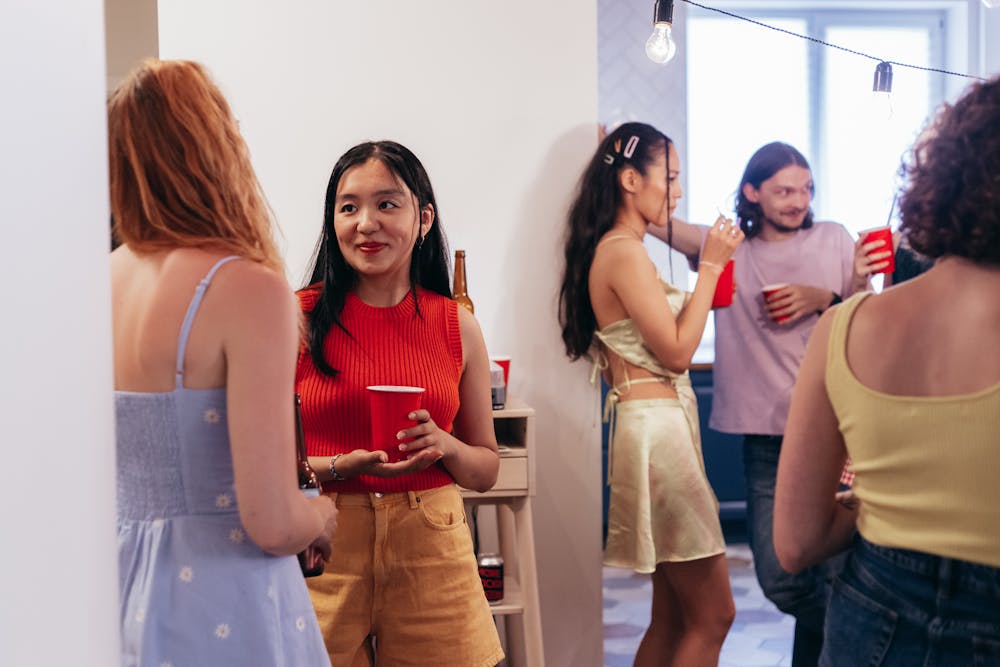
A major fear for hosts is unauthorized parties. Parties and gatherings always run the risk of broken glasses, spills, stains, and a general mess that you want to avoid at all costs.
To eliminate this problem, the best thing you can do is to prohibit parties entirely. If you do allow gatherings on your property, the amount of guests and specific rules surrounding parties needs to be entirely clear to avoid potential confusion.
No pets
Many Airbnb hosts choose to ban pets because of the potential damage they could cause and the extra cleaning necessary for turnover. Unless you plan on marketing your Airbnb as a pet-friendly property, it’s best practice to include rules surrounding pets.
For example, you can ban pets altogether, allow certain types or sizes of pets, or charge more for pets. Whatever you decide, make sure the rules are clear.
Smoking
Another common Airbnb house rules example has to do with smoking. Fortunately, most guests understand that smoking isn’t usually permitted inside the house. But just to be safe, you’ll always want to be clear about this in your Airbnb house rules.
To do so, you have a couple of options.
No smoking
Your first option is to prohibit smoking altogether. After all, smoking is a fire hazard, and banning smoking from your property is a safe bet.
No smoking inside the property
Another option is to prohibit smoking inside the property to prevent odors and damage to property, but allow it outside. If you have a designated area for smokers, detail where the location is and any rules surrounding usage.
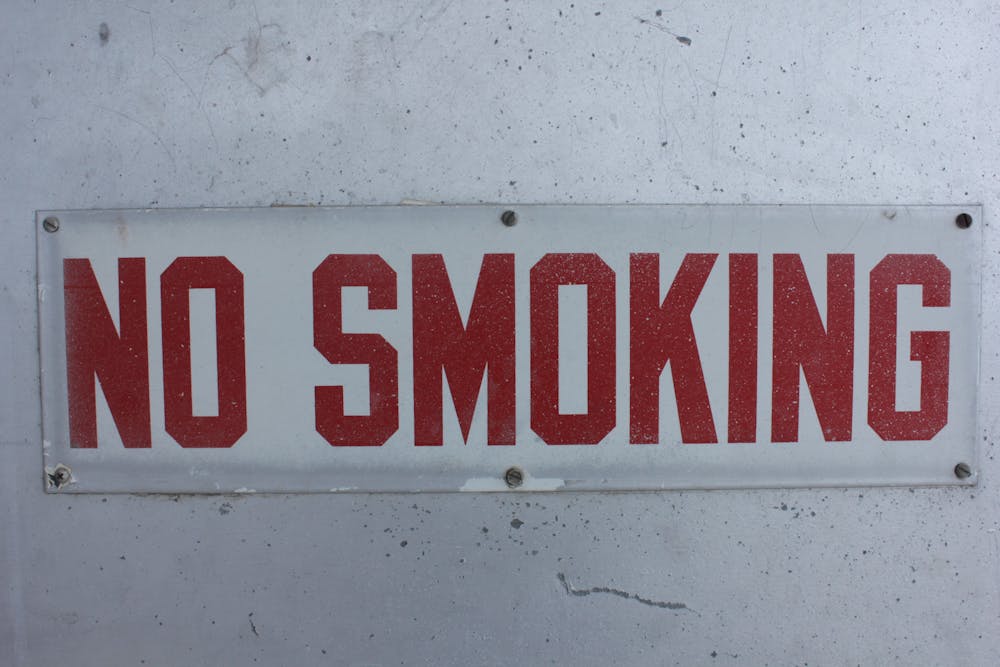
Unregistered guests
Much like the issues associated with parties, extra guests are less than desirable. Any additional visitor takes an expense out of your pocket.
To stay in good graces with guests and avoid future problems, it’s best to either not allow extra guests or to set a capacity limit with a no-overnight clause.
Checkout times
What time do guests need to check out of your Airbnb? Remember to leave enough time to prepare the unit for your next guests, without putting checkout so early that it dissuades guests from booking.
If you allow late checkout for an additional charge, be sure to specify that, too.
Remove your shoes
Many hosts choose to prohibit outdoor shoes within the Airbnb to reduce the amount of cleaning that will be necessary and potential damage to flooring. Especially in areas with a lot of outdoor activities, snow/rain, and the like, this addition can make a big difference.
To encourage guests to remove their shoes, you might consider providing a shoe rack by the entrance or even slippers for them to use during their stay.
Take out the trash
Many towns and cities have particular rules in place surrounding trash and recycling. If your guests are from out of town, they might not be familiar with the different bins or how to sort their trash. Having rules for trash and recycling is useful and saves you the headache of having to deal with it later.
Noise
Noise curfew
If your property is in a city or neighborhood, you probably have a sound ordinance to abide by. Even if you’re not the one breaking the rules of the sound ordinance, you could still be liable and fined.
To avoid these expenses, include a rule about noise, specifying when quiet hours begin and end.
No loud noise
Another option is to prohibit loud noise altogether. This may make sense if your property’s neighbors are very sensitive to noise or your city has strict ordinances.
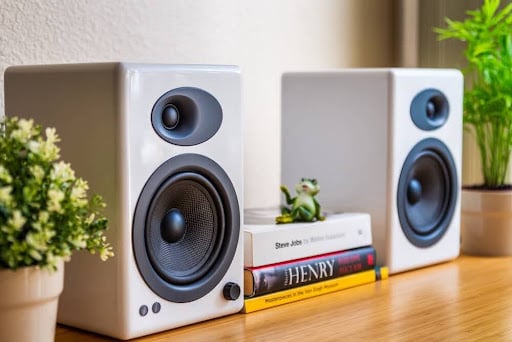
Parking
Parking in a new city or neighborhood can be overwhelming. Including parking instructions in your Airbnb house rules not only ensures that guests don’t park in restricted areas, but also alleviates stress that could negatively impact their trip.
If there’s an assigned parking spot for your Airbnb, specify where it is and how many vehicles are allowed. If guests need to use street parking, explain where they can/cannot park, if there are time limits, and whether payment is necessary.
Illegal activities
It might seem obvious, but it never hurts to be extra careful. Explicitly prohibiting illegal activities will help attract guests who will be responsible and respectful of your property.
Lost key fees
If you’ve ever had a guest lose, misplace, or break keys, then you know how much hassle can ensue. Avoid this trouble by emphasizing the importance of the guest keys in your Airbnb house rules and including any fees associated with lost/broken keys.
No food or drinks in bedrooms
When you’re preparing your property for your next guests, you don’t want to have to deal with bedding stained from wine or takeout. Outlining acceptable eating areas in your house rules can go a long way toward minimizing messes.
Wash any dishes you have used
Do you expect guests to wash the dishes they use? If so, make this clear in your rules, including information on whether they can use the dishwasher or not.
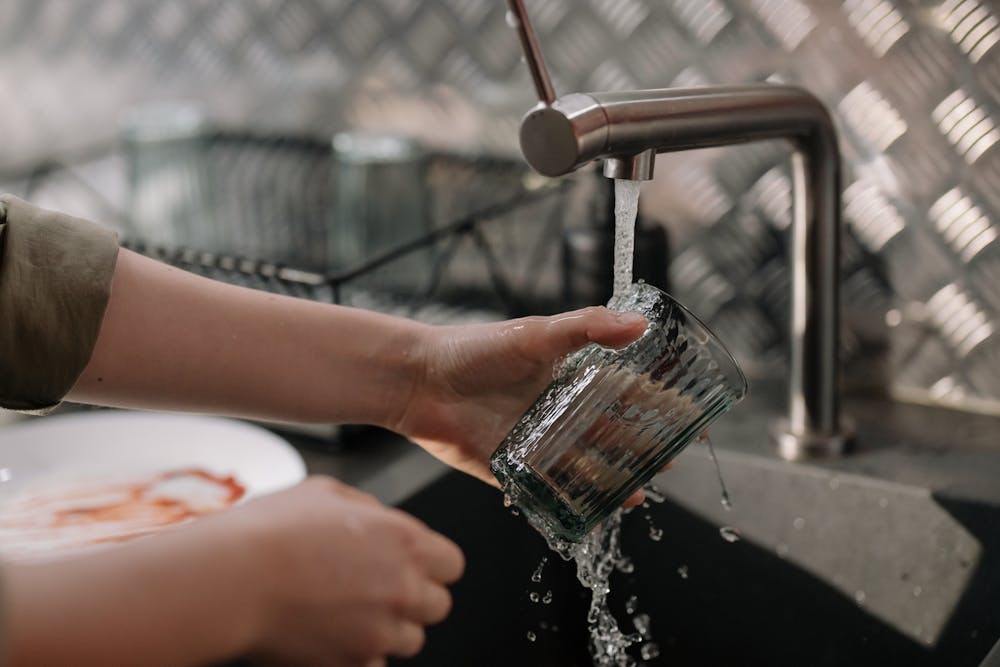
It may also help to leave any dish-washing materials, such as soap and a sponge or rag, clearly visible on the counter where guests can see them.
Maintaining the property
While we’d like to assume guests will be respectful of the property, outlining your specific expectations is best practice. For example, do you expect guests to:
- Clean up after themselves?
- Take out the trash?
- Strip the beds or wash dirty linens?
You should also make it clear that it’s the guests’ responsibility to notify you (the host) in the event that anything breaks or isn’t functioning properly.
Rules against rearranging the furniture
This is another rule that you’d expect guests to take as given. However, guests who start to feel just a bit too comfortable have been known to rearrange furniture—especially during extended stays. Then, you’re left with the hassle of putting everything back in place after they checkout (not to mention potential furniture damage).
So, consider including a rule against rearranging furniture in your house rules.
Safety regulations
Including safety regulations is essential to ensure the well-being of your guests and protect your property. These may include city regulations, such as a ban on bonfires, or simply rules to prevent incidents. Consider including rules related to:
- Smoking
- Candles
- Stove use
- Barbecue use
- Locking doors/windows
- Using rugs in bathrooms to prevent slips and falls
Off-limit areas
Even if you rent out the entire property, there might be certain areas that you want your guests to avoid. It’s important to be explicit about this so guests feel comfortable using the proper spaces and also avoid damaging the restricted areas.
What areas might you want your guests to avoid? Any areas that are under construction, are for personal use, or just generally aren’t intended for the guest should be mentioned in the list of restricted areas.
Appliances and electronics
One of the greatest benefits of staying in a vacation home versus a hotel is the appliance and electronics offerings. Unlike traditional hotel accommodations, many short-term rentals come with a complete kitchen setup as well as appliances in the bathroom or laundry area.
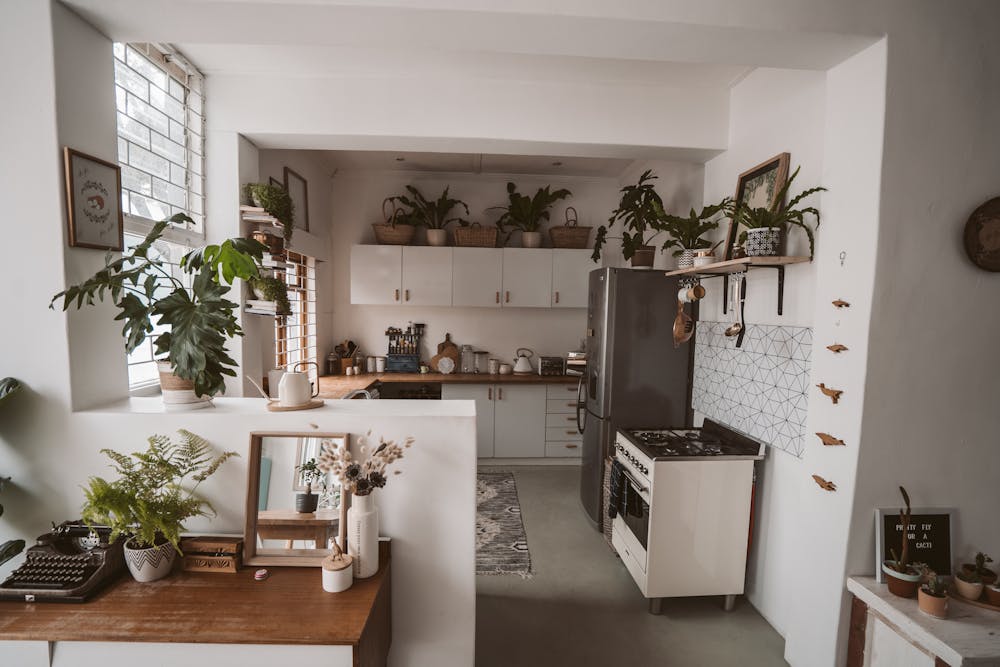
These perks help to increase bookings, but rules are necessary for property usage. Be clear about the usage of each appliance in the house to avoid problems.
Sample house rules for Airbnb
So, now you’re aware of common Airbnb house rules that hosts tend to include in their rental agreements. But what do these rules actually look like?
Below, we include an Airbnb house rules sample list to help get you started:
- No parties or events: Parties, gatherings, and functions of any kind are strictly prohibited on the Airbnb property.
- Pets: Small dog breeds under 20 pounds are allowed.
- Smoking: Smoking is prohibited inside the home and within a 50-foot radius of the house. There is a designated smoking area on the back patio with ashtrays provided. Smokers are only to ash and dispose of cigarettes in the ashtray provided.
- Unregistered guests: Guests are only allowed a maximum of two visitors for the entire duration of the stay. Under no circumstances will visitors be allowed to stay the night.
- Checkout: Checkout is at 11 a.m. Late checkout can be accommodated for an additional fee of $15, to be agreed upon with the host at the time of reservation.
- Shoes: Please remove your shoes upon entering the house, as water from rain and melted snow damages the hardwood floors.
- Trash and recycling: Recycling is to be disposed of in the blue bin, organic and compost is disposed of in the brown bin, paper and cardboard products are thrown in the yellow bin, and all other trash can be disposed of in the black bin. All trash must be disposed of in these designated bins and should never be left around the property.
- Noise: Guests and visitors must keep noise to a minimum so as not to disturb the occupants of neighboring properties—especially during nighttime hours (e.g. 11 p.m. – 8 a.m.), and upon arrival and departure.
- Parking: You may park one vehicle in the driveway of the property. For additional vehicles, there tends to be plenty of free parking in our street. The garage will be locked and is off-limits.
- Illegal activities: All illegal activities, not limited to the use of illegal substances, are strictly prohibited.
- Lost key fees: Keys are to remain in the possession of the primary guest at all times during the stay. The keys should never be replicated or left out of the care of the primary guest.
- Eating areas: Eating and drinking should be limited to the kitchen and dining areas. Please refrain from eating/drinking in the bedrooms.
- Dishes: Hand-wash any dishes you use with the soap, sponge, and drying rack provided. Although the property has a dishwasher, it is not currently functioning.
- Maintenance: Please inform the host in the event that anything breaks or isn’t functioning properly, and we will do our best to address it during your stay.
- Rearranging furniture: Please do not rearrange any of the furniture within the property. Outdoors, there are patio chairs that you can rearrange as you please.
- Fire prevention: Do not smoke or use candles indoors, and be sure to turn off the stove when it’s not in use to prevent fires. Although there is a fire pit in the backyard, fires are prohibited during wildfire season (June-September) to reduce risks.
- Off-limit areas: Guests are prohibited from entering and using the outdoor shed and upstairs attic. Under no circumstances will guests be allowed to enter these areas.
- Appliances and electronics: TV usage is allowed for guests during the entire duration of their stay. The streaming services included are Netflix, Prime Video, and Disney Plus. Guests are not allowed to purchase, download, or rent any subscription or entertainment not listed above.
These sample Airbnb house rules are a great place to start, but keep in mind that you’ll need to tailor them to your specific Airbnb. Prefer a printable Airbnb house rules template that you can customize for your property? Scroll to the bottom of the page to download our Airbnb House Rules PDF!
Are Airbnb house rules legally binding?
Yes, Airbnb house rules are legally binding, but be wary of any exceptions to the rule. The Airbnb terms and services are legally binding and well backed by a legal team. Likewise, your own house rules can be legally binding, but in the event of a court case or legal issue, you might have trouble defending it under the law as a standalone document.
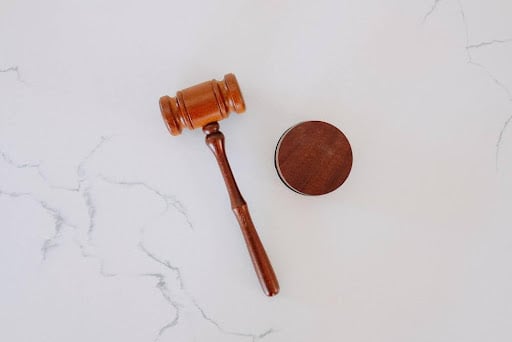
Some hosts choose to incorporate their house rules into the rental agreement to give them more legitimacy. If guests break a rule, this would be considered a “breach of contract” and therefore could have legal consequences.
Download our free Airbnb rental agreement template here!
What to do if Airbnb guests break house rules
The reality is guests will break the rules, whether intentionally or accidentally. It will happen and you’ll need a clear response and action plan for when it happens to keep the interaction professional and resolvable. When an Airbnb guest breaks house rules, you’ll need to think about how to proceed before acting any further.
Depending on the severity of the offense, you might have a couple of different routes to follow. Gauge what you think would be the best course of action for each scenario so as not to aggravate the situation and get bad reviews.
Speak with your guests
You’ll never know what happened or what your guests plan to do to resolve the situation if you don’t ask! In many cases, guests are happy to right the wrong if you just talk to them first.
Let’s say, for example, that a guest broke a bedside lamp. If you talk to them about it and explain that the cost will be deducted from their deposit, you might not have to take any further action. In the best-case scenario, you avoid unnecessary paperwork and make your guests a whole lot happier.
This highlights the importance of having a damage deposit in the first place. Without one, you risk having to jump through several hoops for reimbursement.
Address the issue immediately
If your guests report damages during the stay, the course of action should be established in the timeframe of the reservation. Nobody wants lingering problems after their vacation. If you have a plan to fix the problem before they leave, then your guests can finish their vacation without further problems.
This does NOT mean that you should actually have the damages repaired during their stay, only that the reimbursement of the damages and scheduling of the repairs should be done during the period of their stay.
The best time to get these damages squared away is at checkout. Obviously, you can’t visit the property in the middle of their stay, but if you include a home inspection as a part of the check-out process, it will allow you to take care of the problem while your guests are present.
If you discover the damage after check-out, you can still swiftly deal with the rule break. Follow up with guests immediately and before the next guests arrive. It will get harder to prove fault if you’ve already admitted other visitors onto the property at the time that you accuse the previous guests of breaking the rules.
Keep it professional
This one should go without saying. We all want to believe that there’s a silently understood agreement of trust and respect when it comes to a guests’ stay, but sometimes rules are broken and poorly handled.
It needs to stay professional on your end. Not only to avoid bad reviews or guest dissatisfaction, but also because these interactions could, in the worst case, be assessed in court.
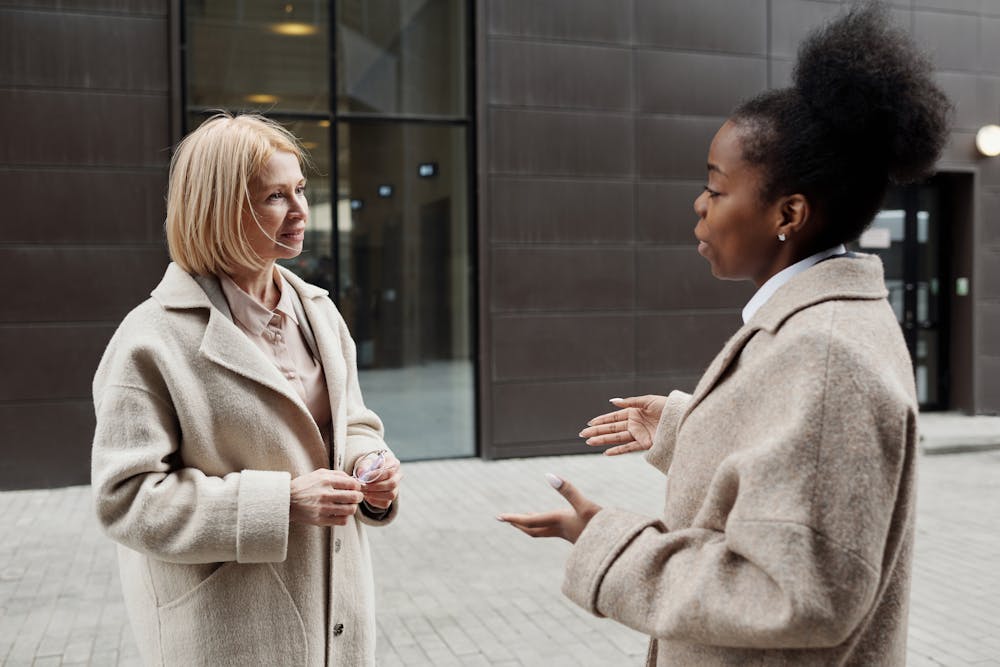
If you’re handling the broken rules poorly and not appropriately communicating with guests, you risk looking unprofessional and losing your legal standing in court.
Reimbursement or filing claims
If an expense, fee, or fine was incurred at the fault of a guest, you need to clearly write down the amount owed and make the guests aware of this charge and how you got to that number. If it’s something simple like a parking ticket, you can attach a copy of the fine as proof of the owed amount, but it gets complicated when property, like artwork or landscaping, is destroyed.
The best thing you can do is have receipts on file of all the purchases you made for your vacation rental. That way, if a guest breaks something, you’ll have documentation of the exact value of the item. If you don’t have the receipts, hiring an appraiser for high-value items is advisable.
All requests for reimbursement should be made on paper. Remember that verbal agreements, especially as they relate to vacation rentals, will not hold up in court.
How to remove guests who break Airbnb house rules
In some cases, you simply must ask guests to leave the property. If you decide that it would be worse or more costly to continue a guest’s stay, then the best thing you can do is terminate their reservation and ask them to leave.
Handle this with extreme care to avoid further problems. Be professional, calm, and clear about the reason for removal. You need to state the amount of time guests have to vacate the property.
To avoid problems, you should be on the premises at the time the guests are removed.
How to set up Airbnb house rules
You must share your Airbnb house rules before guests start their stay. Hosts can choose if the house rules should be agreed upon at the moment of booking or anytime before the reservation begins. The important part is that you reach an agreement before guests step foot on the property.
As mentioned, you should include the house rules in your Airbnb rental agreement. Not only does this save your guests the trouble of having to skim through legal documents multiple times, but it also gives legitimacy to your house rules.
Where are house rules on Airbnb?
House rules are found under your “listings” settings on the Airbnb website. You can mention them there and they will appear under your property. However, if you want to have it as a separate document, you’ll need to send it to your guests separately.
How to edit house rules on Airbnb
If you have your house rules directly listed on Airbnb, you can adjust the rules by going to your listing on the Airbnb website and following these steps:
- Click Manage listing on the listing you want to edit.
- Click Booking settings at the top of the page.
- Next to House rules, click Edit.
- Select your expectations and rules for guests, then click Save.
Download our free Airbnb house rules template PDF
Good news: We’ve made the work of creating your own house rules easier by putting together an Airbnb House Rules Template, free of charge to download. Our template covers the basics as well as extras that others have recommended in their Airbnb guidebooks.
Download the Airbnb House Rules Template and add, remove, and update items as you see fit. Remember that every property is different and thus requires different rules. And covering all your bases is best practice to ensure that you protect your property and create a positive guest experience!
Here’s a preview of the template, but be sure to download the full, customizable version below!
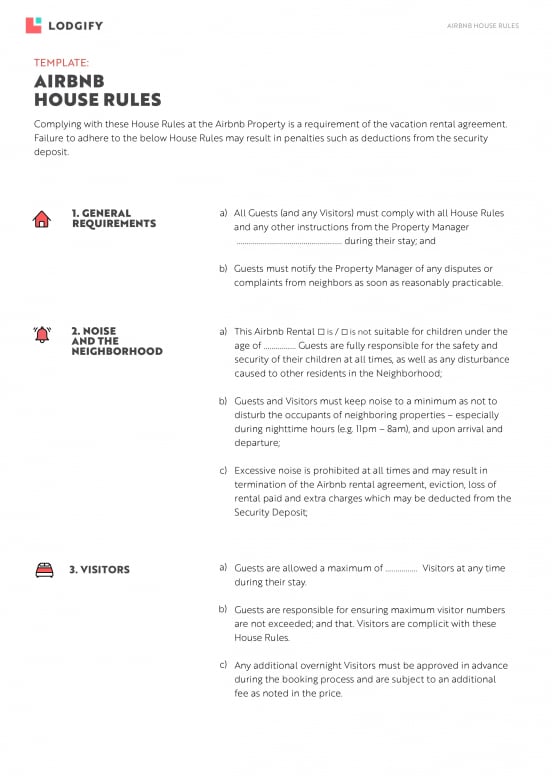
Looking to simplify your Airbnb business? Our channel manager allows you to take control of your Airbnb connection alongside other major channels like Booking.com and Vrbo. Automate tasks like sending your house rules to guests and thanking them for their stay.
Ready to see just how easy it can be? Try out Lodgify for free with our 7-day trial!